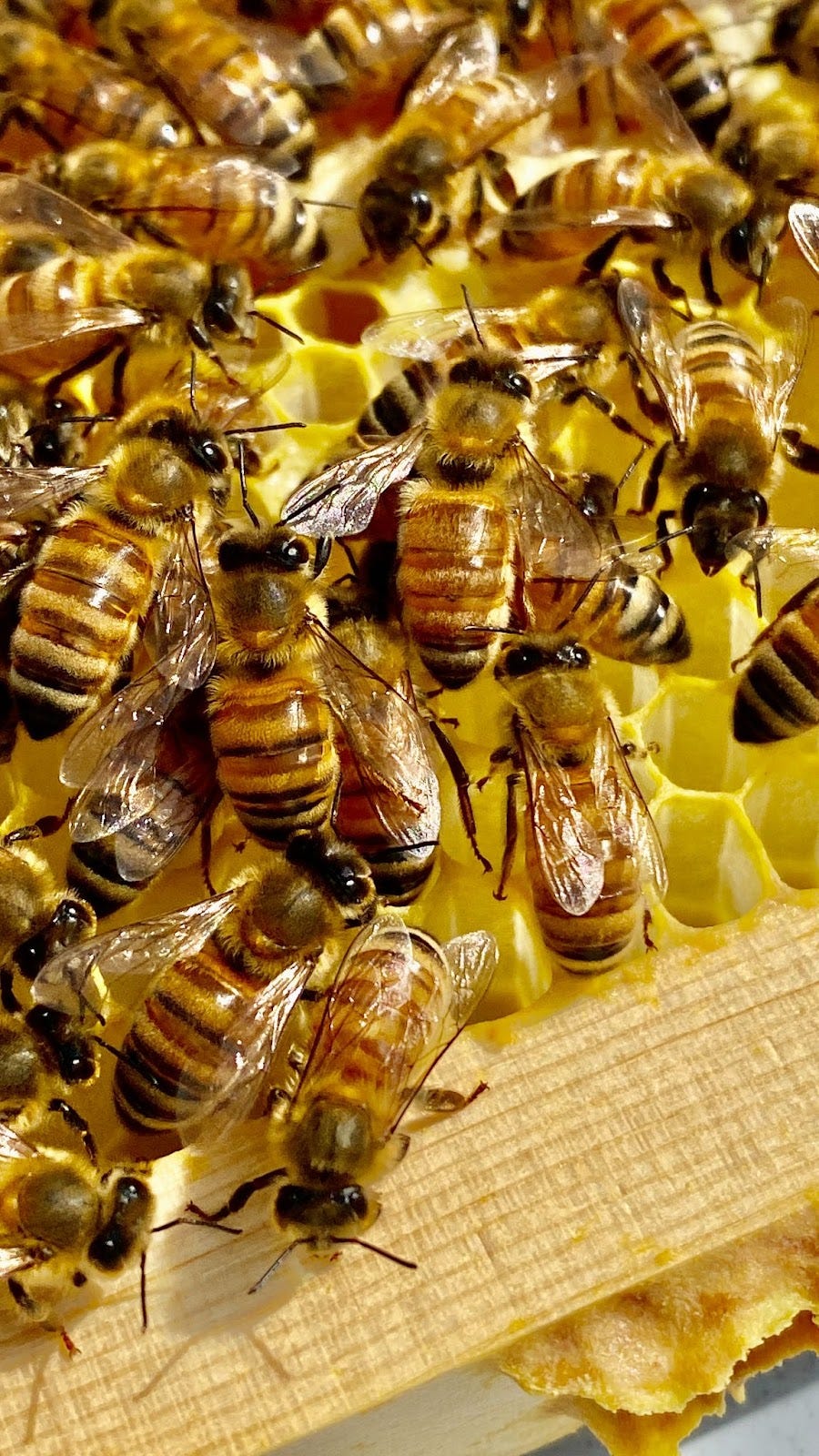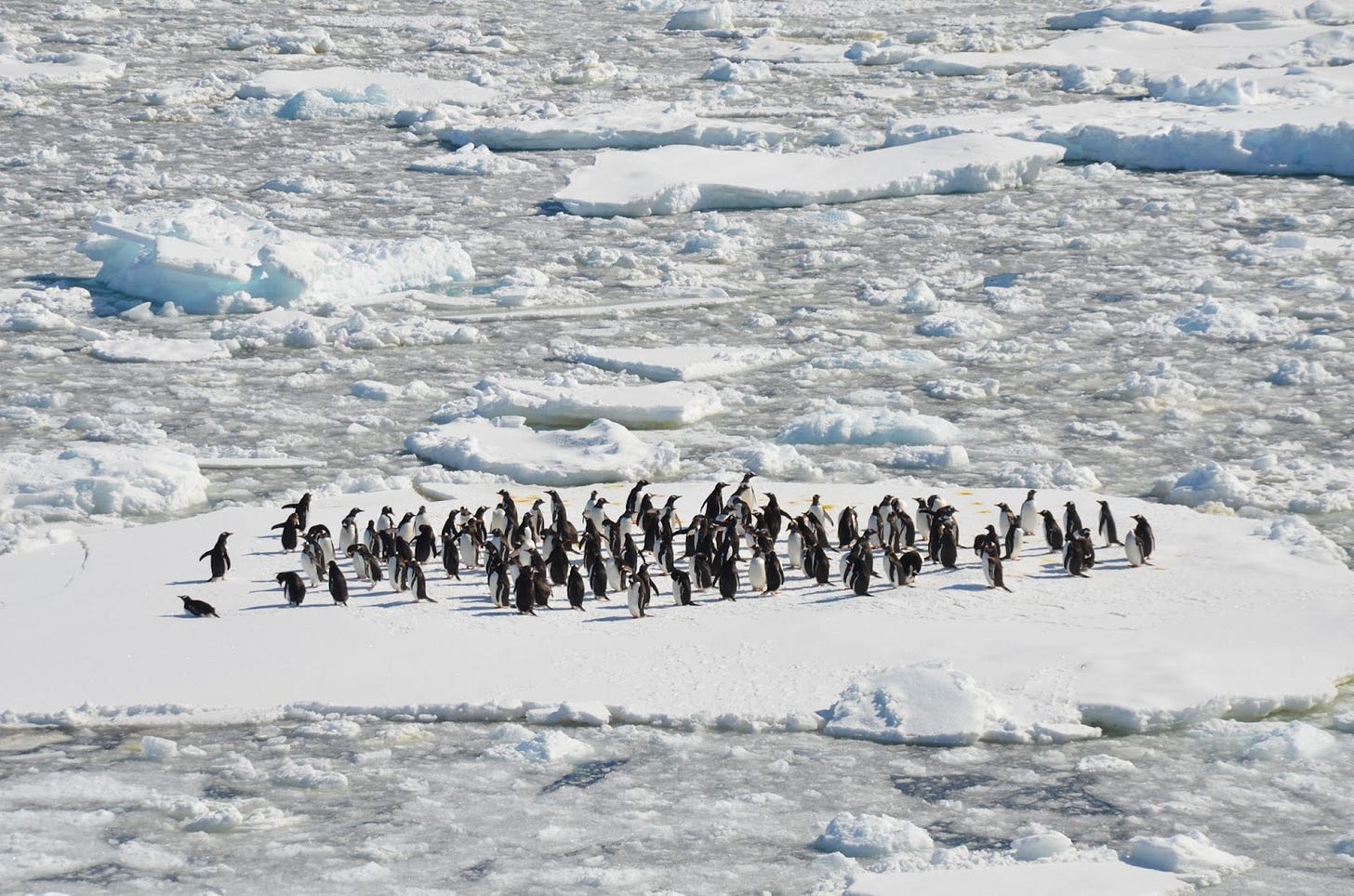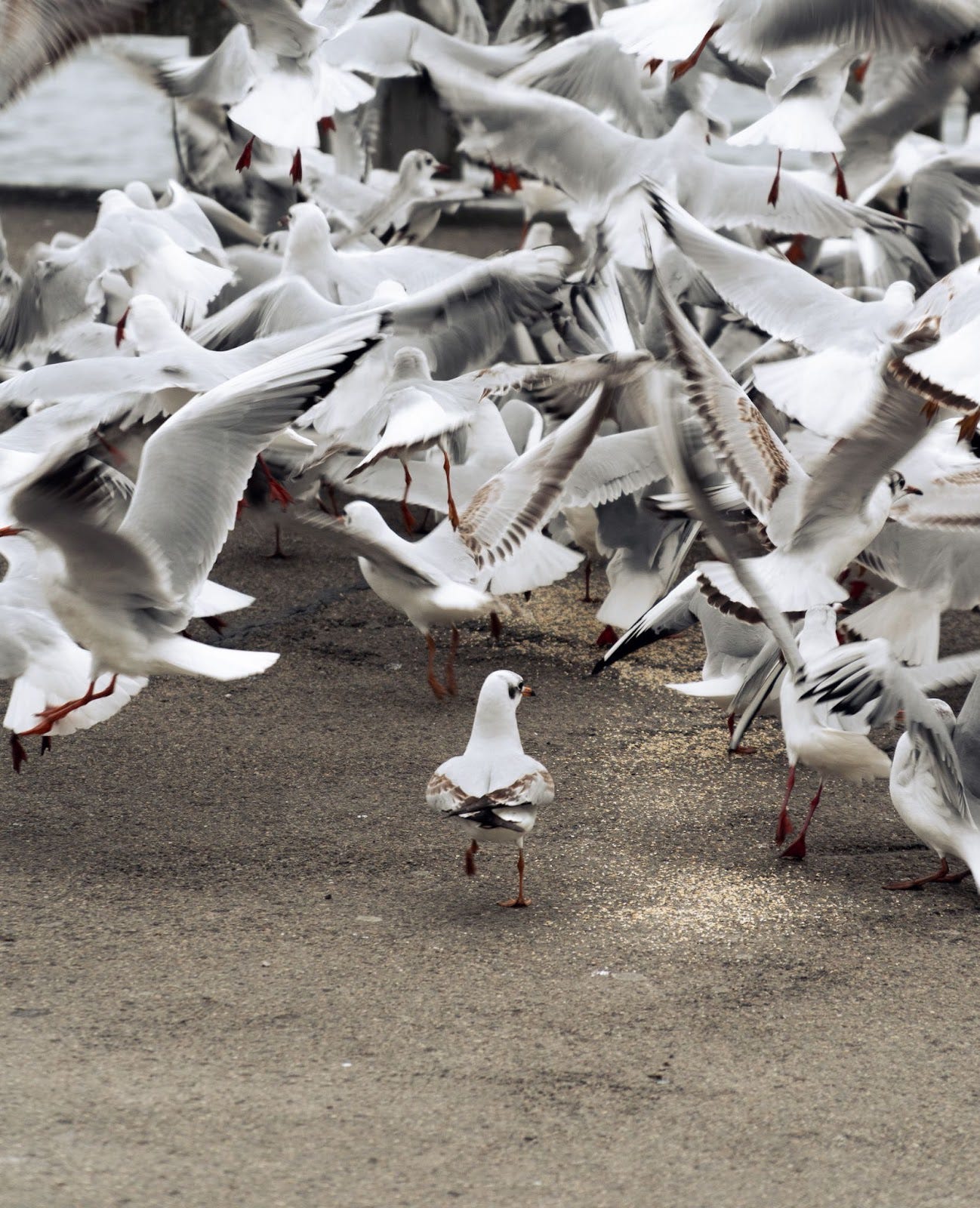Choosing the group, even when it's the hard thing to do
A guest post from Elizabeth Marro
Welcome to You Think Too Much! This Monday, we have an extra special guest—writer, Substacker and New England native Elizabeth Marro and we’re talking all about community—how hard it is but how rewarding it can be.
Meet Elizabeth Marro
This week, I listened to an interview with music producer Rick Rubin where he described how sometimes, certain ideas are ready to be born into the world. You have an idea for a novel you don’t write and then six months later, you see a novel in the bookstore with that same idea (which, yikes!). That’s not because someone stole your idea, but because the idea was out there, in the communal ether waiting to be called into being.
Maybe that explains this convergence on community
and I felt happening between and which made us decide to try a swap. Elizabeth’s recent post about big and small lives got me really thinking about how that idea applies to community and the importance of the local (also the tagline for a podcast about Madison, should I ever decide to make it—Small Town. Big Lives).If you haven’t read and subscribed to Elizabeth’s newsletter yet, do it now at
. It’s a great community of folks exploring life through the lens of reading and writing. Elizabeth is the author of Casualties, a novel about war and family and grief which I’ve just picked up from the library and am so excited to dive into.So happy to be able to share Elizabeth’s thoughts on the comfort and challenge of community and Geoffrey L. Cohen’s book, Belonging, which I have not read but is on my to-be-read list now! Thanks so much, Elizabeth!
The Comfort and Challenge of Community
By
“I find myself thinking about the tension that exists between the desire for community, family, love, and the desire -- the need -- to be alone. “ _ My Second Favorite Thing
I wrote those words a couple of years ago. I am still feeling this tension. I’m beginning to understand that I may always feel that tug between the desire for connection and the desire to opt out, to be free of the constraints that come with being part of a group whether it is a family, a community. I also understand, though, that if I had to choose, I would slam the door on that room of my own and choose to live cheek by jowl among other people, my people. This becomes more apparent with every passing year.
I choose the group because I am human and hard-wired to be a social animal according to science. It’s also because I am afraid that if I don’t choose my people, they will abandon me and that fills me with apprehension and dread. We are hard-wired to feel a kind of social pain when we are left out, or feel we don’t belong, according to Stanford psychologist Geoffrey Cohen. He cites work done by Kipling Willliams that shows how human brains respond to ostracism in the same way they respond to pain. To be cut off from the community causes pain. It is why bees, for example, use ostracism to control their group, and why shunning was and is used by some religious or other communities. It is why, when I was one year into my first job out of college and my colleagues began to explore unionizing the reporters on the paper, I was torn between my loyalty to the man who had hired me and the group who would never regard me as one of them if I resisted.

That fear is accompanied by the comfort I feel when I am with “my people” combined with the thrill of feeling like I belong. Last month I traveled a few blocks from my house to attend a gathering of people who write. I knew a few of them but many were strangers. That didn’t matter, we all spoke the same language. It had been years since I’d been in a writing group or attended a gathering of more than four or five people (thank you, Covid). I felt renewed. Neurons fired. I felt seen in a whole new way or, rather, a way I’d missed and didn’t even realize it.
I felt that same comfort, that same thrill when I first moved to San Diego two decades ago and began to attend the nearby Catholic Church. I’d made several returns to the Church that had not gone well but here I was, new to an entire city. I was driven to find my people, to make this place feel like home. I found fellow writers and friends at conferences and in classes. I helped start one writer’s group and joined others down the road. More recently, when our world began to turn upside down, I sought out those who shared my political beliefs and concerns about the community and channeled my fear and outrage into attempting some kind of action with others.
As I read over what I’ve just written here, I am struck by two things: 1) I am no longer an active member of any of these communities, or at least not as active as I intended to be when I started out and 2) The words “my people” crop up with a frequency that makes me uneasy.

Community is both comfort and challenge, a wise priest reminded me when I expressed some resistance and doubts in the early days of forming small, intimate groups intended to foster greater connection with our parish and our church. The need to belong, to feel at home, is seductive. The challenge comes when it’s time to give back or to be held accountable by the group. Then there is the danger that resides in yet another “c” word: conformity which can masquerade as loyalty.
Right about now you may have pegged me as a suspicious sort of person who might struggle with trust or commitment and you would not be entirely wrong. For me, relationships are a long ongoing dance: two steps closer, one step back. One minute I am thrilling to the possibilities and comforts of uniting with another or, in the case of a group, with several others. The next moment I am recoiling, retreating into myself when confronted with the reality that other people are as messy as I am. Put us all in a group together with our disparate skills, leanings, emotional makeup, and widely varied experiences or backgrounds and the opportunity for chaos is everywhere. I feel a desire to control things I can’t control, to correct people instead of accepting them or focusing on their strengths and mine to explore where we might fit. Just ask my many younger siblings who had to suffer growing up with me, who still suffer my mistakes as I continue to learn and grow.
And something insidious happens when I start to think about “my people” With those two words, I’m defining a group with boundaries that can create a sense of security and leave a lot of other folks out in the cold. I’m trying to shrink a world that overwhelms me with the scale of its problems and demands but in doing so, I may be contributing to the polarization that has invaded every level of our society. Add social media and the steady torrent of terrible news and I alternate between fear of missing out and defeat in the face of what is most terrible in our world.
I was caught in this kind of no-way-out sort of thinking when a few recent encounters put my angst on pause. A few weeks ago, I caught an interview with Geoffrey Cohen, author of Belonging: The Science of Creating Connection and Bridging Divides when he talked not only about the psychic pain of being excluded but the ways humans respond when we make them feel seen. He calls it “situation shaping” but it looks like basic kindness and courtesy to me.
“One of the most powerful predictors of people’s behavior is the situation they are in right here right now - what is happening around us - including a wink, a smile, being treated politely. We think that what matters most is personal psychology but situation is key. We share power. We are each part of the situation in which we find ourselves…“By shaping the way we act day-to- day … we can have a powerful effect.” - Geoffrey Cohen: How The Need To Belong Drives Human Behavior (Interview)
Then I read Robyn’s essay Tears, Goosebumps, and Awe which reminded me of those moments that lift us out of ourselves, most of which are those moments we share with others. Her insightful comments on a post I wrote a few weeks back have also stayed with me:
“I think we should all be prioritizing the smallness of our lives, in the sense of our local worlds. There's a lot of pressure to keep scrolling--through your social media feed, through the news. There's so much pressure to keep bombarding yourself with information that is "out there" in the "big" world. But I don't think that's helpful to most of us or to the world. I have limited means to affect what's going on far away, but much more ability to make a difference in my community.
But, engaging face-to-face, with people in my small circle, who are difficult, complicated humans who may not always agree with me? That's hard. It's maybe easier to keep scrolling through IG, liking posts of the people who agree with me. I think that we've forgotten what real, complicated, uncomfortable community looks like. We're not good at it anymore and society tells us not to do it. God forbid, don't talk to that person in your town or on your street who didn't vote for the same person you did. That's traitorous. But I think not talking to each other is part of what got us here in the first place and what will keep us here. Real community is so hard. And so small. But so, so important.” - Robyn Ryle
Sometimes, when I need it the most, messages like these find their way to me and I realize that I am not alone despite my halting steps in the dance I am in with other people. There is comfort in that but, also, challenge. Since that interview with Cohen, for example, I’ve been practicing small boundary-leaping behaviors: making eye contact with strangers I pass on a walk or at the store, smiling and making a little conversation. I’m noticing the comfort that it gives me when they smile back or nod in acknowledgement. I’m noticing it doesn’t much matter what color cap they are wearing or what the bumper sticker on their trucks say about their politics. A hello is a hello. A smile is a smile. They are small beginnings, they are real, and they feel so, so important.
What do you find the most comforting and/or the most challenging aspects to cultivating and being part of a community?
A few books that also got me thinking about community
The stories in Deesha Phillyaw’s The Secret Lives of Church Ladies revolve around women who stand inside and outside the community of their churches which for some are a haven and for others a prison and for still others a court which judges them harshly.
I’m halfway through Robin Wall Kimmerer’s Braiding Sweetgrass: Indigenous Wisdom, Scientific Knowledge, and the Teachings of Plants which is underscored by the notion of community built on reciprocity and is not restricted to humans. We are as beholden to the plants and animals and earth that sustain us as we are to each other.
Jennifer Coburn’s Cradles of the Reich is the story of three very different women caught in Nazi Germany where the stakes for not conforming are high. Each woman must forge her own response to the expectations of family, community, and the party in power.
Thanks so much for the great post, Elizabeth! Check out my guest post on , here! And welcome to all the new subscribers! So glad to have you here.






Yes, Mary. I find those conversations with people I disagree with easier in a classroom setting, which is probably because I’m in charge! I struggle with those conversations more in other settings, but one of things I’m working on.
Love this collaboration! I think a lot about community these days, and talk about finding "my people." I, too, have felt the importance of connection with others, no matter our differences, but have crashed repeatedly into the challenges. I wrote an essay about my attempts to at least like my difficult neighbors: https://lisareneeh.medium.com/the-call-for-unity-is-a-utopian-fantasy-3de0fa2316d2). I'm all for smiling and making eye contact, and I try to always be kind. But people are tough, some of them impossible. I would love to find a writing group, however. I can take a little challenge and would love some comfort.